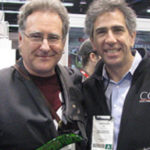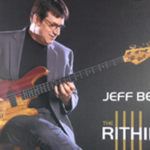Jazz bass maestro relays news about his online radio station, upcoming albums
By David Sands
May 13, 2015
Brian Bromberg has never been one to shy away from a challenge.
The Arizona-born bassist, composer and producer started earning his chops at the age of 19, touring with the iconic jazz saxophonist Stan Getz in the late Seventies. Since then he’s played with a slew of all-stars, including Dizzy Gillespie, Sarah Vaughan and Lou Rawls, and led a successful solo career.
Skilled on both acoustic and electric bass, he’s made a name for himself in the smooth jazz world with albums like Magic Rain and BASSically Speaking, charted in the traditional jazz realm, and delved into fusion and unorthodox song interpretations, too. The Grammy-nominated musician has also helped popularize piccolo bass playing and created his own signature line of basses.
Over the last few years, he’s also been involved in what may be his most challenging project yet, a bass-centric online radio station called “Bass On The Broadband.” FBPO’s Jon Liebman spoke with him recently to discuss the radio project, his preferred gear and several upcoming music projects.
Bass On The Broadband first began blasting its way down the information superhighway back in April 2012. Listeners now tune in from 163 different countries.
Carol Handley, a friend who’d been Program Director at Seattle’s KWJZ commercial jazz station, served as Bromberg’s inspiration. When KWJZ switched formats in 2010, she launched her own Internet station, Smooth in Seattle, to fill the void. Observing her work, Bromberg got the itch to start his own online broadcasting operation one day while he was surfing the web. He did several searches for bass player stations, couldn’t find any and resolved to start his own.
Handley helped him build Bass On The Broadband from the ground up, using the same hardware and software as her station. Dismayed by the decline of the record industry and radio jazz in recent years, Bromberg sees the station as a touchpoint for the global bass community. He hopes to familiarize listeners with old greats and give up-and-coming players greater visibility.
“We will probably never see another Jaco Pastorius or a Ray Brown,” he tells FBPO, “but who’s ever going to be the next guy, it’d be really nice if they have a format and a place to be heard.”
The station plays both electric and acoustic bass in many genres, and its site has information on how bass-playing listeners can submit their music.
Last November, Bromberg enlisted the help of a computer services firm to help overhaul the station’s website, branding and online visibility. Since that time, its audience has tripled in size. Even so, the broadcaster is struggling to make ends meet.
Unlike some online stations, Bass On The Broadband licenses it music and pays artists royalties through organizations like ASCAP and SoundExchange. The fees add up, though. Bromberg has already paid many thousands of dollars out of his own pocket to cover licensing, and times are tougher than they used to be, even for a well-known musician like him.
“I’m just a bass player who plucks strings. This has been a labor of love,” he says. “If we can’t keep getting more sponsors and more people to help out financially, I’m not going to be able to keep it up. It’s just too expensive.”
Beyond his work with the station, Bromberg is now laboring away on three very distinct albums.
The first of these is for Japan’s King Records, a company with a history of asking him to embark on unexpected projects like his Jaco Pastorius tribute album and In the Spirit of Jobim, a work inspired by Brazilian Bossa Nova great Antonio Carlos Jobim.
The untitled project has Bromberg giving his own spin on timeless classical themes like Ravel’s Bolero, Beethoven’s Fifth and Rhapsody in Blue. Although the album “petrified” him at first, he accepted it as a challenge.
“I love having to rise to the occasion and figure something out and make it sound like Brian Bromberg, even though I had nothing to do with it,” he says. “And now I love the record. I’m very proud of it”
Available in late summer/early fall, Bromberg says the King Records recording will span various genres and utilize a palette that includes acoustic bass, electric bass, distorted piccolo, orchestral sounds and bombastic drums.
It will also mark his professional debut on drums. As the son of a drummer, he’s geeked to be doing this and plans to pound the sticks on his upcoming still untitled Mack Avenue Records albums too.
Scheduled for this fall, one will be a straightforward jazz album with a Bromberg twist. Listeners can expect jazz guitar, piano, acoustic bass and drums, along with a horn section and even an zydeco-inspired accordion on some tracks.
In order to play both bass and drums parts, Bromberg programmed a drum machine, followed up with the bass parts and then dubbed over the drum tracks with real drums.
The other album, from Mack Avenue Records’ Artistry label, goes deep into the groove, funk from beginning to end.
“It’s something that I have always wanted to do and never did, and I’m excited about it. It’s all original except for two tunes that I co-wrote with my nephew. He’s into hip-hop and R&B, and he does really great grooves.”
Electric bass will dominate the Artistry album, but there will be a few hints of racy acoustic bass. Fans can expect it to drop sometime next spring.
So what does a highly respected and sonically adventurous musician like Bromberg play to get the sound he wants? To start with he’s got his own line of Carvin basses, the B24 four-string and the B25 five-string.
He worked out his original plans for the bass design in the early Eighties, but says before Carvin no companies could get it right.
“They sound phenomenal,” he tells FBPO. “We worked on the pickups and the circuit board for a year-and-a-half.”
“They did a spectacular job on the instruments: the workmanship, the wood quality and the fact that they’re American-made,” he adds, “At the price point, there’s nothing close to what they do.”
As for strings, La Bella is the only brand for Bromberg. Now in his fifties, he’s been relying on them since his twenties.
”They’re great guys,” he says. “The strings are hand-made. The thing that’s really amazing about them is you tell them what you want, and they make it. All the piccolo strings, all the nylon strings, they really, truly can make anything.”
The clear nylon strings he used for the Brazilian “guitar” sound on the Jobim album, for example, were specially made for the album, and he says they sounded “incredible.”
Looking towards the future, Bromberg’s interested in doing more workshops and is in the process of developing a line of accessories. His true passion, though, is the radio station.
“Nothing would make me happier than to see Bass On The Broadband blow up and be as successful as it could be,” he says, “And it’s not about lining my pockets, trust me, because it’s costing me a fortune. It’s more about the fact that the bass community deserves a place to be heard.”






